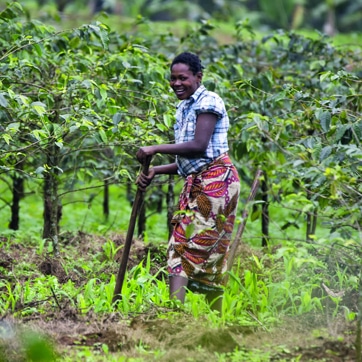
As climate change and extreme weather events become more disruptive to food production and supply chain operations, WINnERS offers risk management services to build resilient supply chains from the smallholder to the global retailer.
The problem
Climate change will have profound impacts on food supply in every country in the world. Weather-related disasters such as floods, droughts and wildfires will likely become more intense. Erratic rainfall and unpredictable weather patterns will result in irregular crop yields. With ensuing disruptions in production and distribution could come higher and more volatile food prices.
In Africa particularly, yields in staple crops such as maize, wheat, sorghum and millet are expected to drop as a result of climate change. According to predictions, by 2030 some African countries could see yields in rain-fed agriculture fall by half and the prices of certain food crops are predicted to increase by anywhere between 50% to 120% by 2030.
Many smallholder farmers fail to sign deals with food retailers and off-tackers which would enhance their financial stability, mainly because of the difficulties associated with increasing their production or even maintaining a stable level of production in the face of extreme weather events. But the practice is developing, and with this the realisation that the frailty of smallholder farmers places pressures on the food supply chains which European distributors partly rely on. For food retailers, the resilience of smallholder farmers is a risk to their supply networks.
The solution
The EIT Climate-KIC WINnERS (Weather Index based Risk Services) programme is starting to play an important role in these issues. Banks, insurers, food companies and farmer cooperatives are teaming up with European universities and research centres to find ways to increase resilience in supply chains, in a way that protects smallholder farmers from climate-driven risk and losses. This programme aims to develop a holistic de-risking framework involving all stakeholders of the staple food value chains in order to make them creditworthy to their local banks, and allow them to access inputs and markets for staple crops.
At its core sits an index-based insurance that uses machine-learning to deliver robust climate risk information. This information helps smallholder farmers plan ahead to secure their crops and allows them to access loans and insurance services, often for the first time in their lives. The system analyses meteorological and climate data, and a series of algorithms produce highly accurate agricultural risk information. Artificial Intelligence tools help reduce the simulation costs and the level of insurance premiums.
The WINnERS product, implemented with the support of Torus X, a startup providing highly customised de-risking solutions for value chains, and Munich Re, the world’s largest reinsurance group, is now providing mid-level insurance for farmer collectives and is improving the quality of life for thousands of farmers, while simultaneously strengthening food supply chains in Africa.
As a result, climate resilience strengthens, while improved agricultural practices actively mitigate and help to prevent further climate change. Food supply increases, livelihoods improve and the social situation for farmers can transform for the better.
The impact
Through the WINnERS programme, 25,000 farmers have already been insured for their maize production in Tanzania. With the support of the World Bank, studies are currently under way to assess the impacts of the product on smallholder farmers. First results suggest that around 85% of participating farmers gained access to financial credit for the first time in their lives.
Part of the funding for the programme is specifically dedicated to promoting gender equality and financial inclusion for female farmers in Tanzania. As in many countries, Tanzanian women face poor social conditions and are not well represented in local farmer cooperatives. Contracts are now designed with incentives to improve gender equality within farming cooperatives, putting women in higher positions such as management.
WINnERS is one of the first insurance schemes in which the premium depends on the implementation of farming practices that increase crop resilience to adverse weather such as heat stress, or lack of rainfall. This incentivises farmers to improve practices, using techniques such as intercropping, where separate crops are planted close together. This improves yields, and works to mitigate the effects of climate change.
EIT Climate-KIC’s role
EIT Climate-KIC provided critical initial funding and supported the project’s development and incubation, from initial idea to fruition. This included finalising the prototype system, designing, implementing and overseeing pilot projects and producing impact studies. More recently, EIT Climate-KIC and its partners engaged with banks in several countries across sub-Saharan Africa, successfully securing more than $1 million in funding from the African Development Bank to scale the de-risking service in Tanzania, Ghana, Uganda and Zimbabwe. They also secured $550,000 in financial support from the Climate Justice Resilience Fund, which will feed into the initiatives on improving gender equality in Tanzania.
The WINnERS programme is still evolving, thanks to the backing and guidance from EIT Climate-KIC. The team wants to move onto multi-crop insurance programmes, increase the geographical footprint of the project further and develop new agricultural practices along the way. WINnERS has created a positive feedback loop for food security in the face of climate change while actively contributing to social progression across the global south. The programme now aims to operate in 10 countries, and to reach a million farmers in sub-Saharan Africa by the year 2022.

